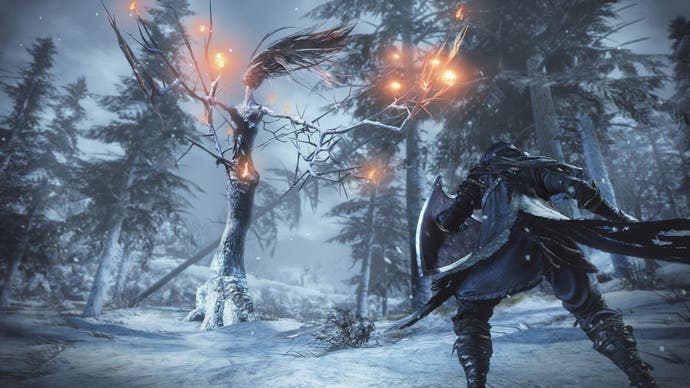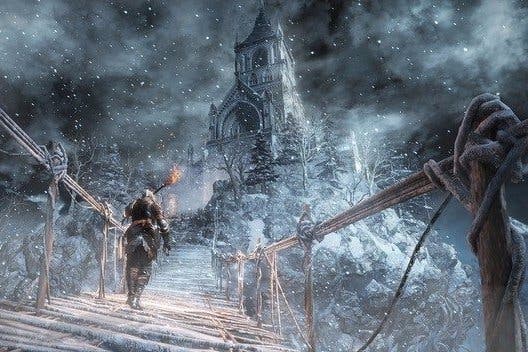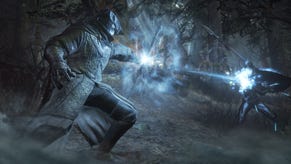Dark Souls 3: Ashes of Ariandel review
Winter dreams.
One of the new enemies From Software introduces in its new Ashes of Ariendel expansion for Dark Souls 3 could best be described as a ninja version of Freddy Kruger. A leaping horror of spindly limbs and metal claws, the resemblance could be coincidence, but I reckon it's not entirely accidental. Freddy invaded dreams, while From's Corvian Knights invade a painted world you're sucked into. These fake Freddys are no less fearsome than Wes Craven's creation. With their berserk souls madly scrambling towards you in a mad flurry of flips and razor-pronged pirouettes, they elicit a lot of character. From Software already built a breathtaking menagerie of monsters across its last few Souls titles (along with spiritual successor Bloodborne), but these ravenous rangers exemplify the developer's penchant for frightening foes.
That's one of the keys to From Software's Souls series: the enemies have personalities, evoking emotions stronger and more sophisticated than mere malice. Rather than the one-dimensional cannon fodder of countless other games, Dark Souls' creatures elicit feelings ranging from despair, pity, admiration, terror and even ethereal wonder. Indeed, Ashes of Ariendel's final boss, in both its introduction cinematic and movement, stands out as one of the most tragic figures in the Souls series. There's a real sense of suffering at the heart of From's perpetually damned ecosystem that offers a delicate blend of fantasy escapism with solemn tones that resonates far greater than any other magical fantasy realm in gaming.
From's art direction is so evocative that it doesn't have to make any sort of literal sense. Supposedly it does, as the likes of VaatiVidya are making a living as virtual archeologists of this series' lore, but concrete comprehension isn't a pre-requisite to getting lost in these melancholy worlds. Admittedly, I'm not sure what exactly Ashes of Ariandel's plot is (nor can I grasp the story of its parent game, for that matter), but the emphasis is on how it makes you feel rather than how much you can comprehend its oblique lore.
And on this level Ashes of Ariandel is a success. Along with porting its best-in-class combat system and labyrinthine level design that's made all the Souls series a pleasure, Ashes of Ariandel captures the gloomy mood that beckoned so many. To me, Souls was always about feeling lost, curious, frustrated and occasionally triumphant. It's here where Ashes of Ariandel stands as one of the series' most foreboding areas.
Set in a wintry wasteland of snow-capped peaks, hollow vikings, howling wolves and shrieking trees, Ashes of Ariandel is rich in atmosphere. Everything in this chilly, white world feels oppressive, even when it's not particularly threatening. Rather than just toss a bunch of high-level enemies at you, From mixes it up with some creepy, but insignificant canon fodder to offer moments of catharsis and curiosity as you slice your way through simple foes before coming across a bloodthirsty scurrying devil with claws that would make Wolverine green with envy. Not everything in Ashes of Ariandel is a literal threat to you, but the rotting corpses of mutated figures - some of whom still have some humanity and can speak - certainly offer an ominous feeling.

But it's not just about the mood. Ashes of Ariandel is also about mastering a combat system. This DLC expansion didn't have to change much in this regard, as From is already the best in class here, but it has tossed in a handful of neat new weapons and expanded the obscure PvP elements into a more convenient competitive arena in which players can choose a battle mode and duke it out as you would in a Halo or Gears of War. PvP has always been the Souls series' best kept secret, as most people tend to ignore it due to its arcane requirements to access. It's not exactly the thing that draws people into these massive, predominantly single-player experiences, but it's an amazing find for those who seek it and the new Undead Matches are a treat for those who want to take a break from the sometimes gruelling main campaign.
The only downside to opening up Dark Souls 3 as a competitive game is that its maps and modes feel insignificant compared to what you'd usually expect of a competitive multiplayer game. So far there's only the one map (though a greyed out menu suggests at least another will follow) and modes are limited to simple objectives based around racking up the most kills within a time limit or as a last-man-standing affair. Furthermore, there's no option to check in-game stats like kill counts or even who's in the lead. You simply see how many kills you or your team has acquired, who wins at the end, and which player murdered the most. It's rudimentary at best, but still a fine way to experiment with Dark Souls 3's most hidden talent.
Ashes of Ariandel isn't as hefty or varied as the similarly priced Dark Souls DLC, Artorias of the Abyss (or Bloodborne's only slightly more expensive but significantly larger The Old Hunters expansion, for that matter), and there are fewer new bosses than you may have hoped, but it offers a real focus on quality over quantity. After all, many consider Dark Souls' finest stage to be its wintry Painted World of Ariamis, which was a relatively small region with only a single boss. Ashes of Ariandel is basically a sequel to that finely honed morsel of Dark Souls goodness, and it's a worthy successor. Inspired and effortlessly elegant, Ashes of Ariandel stands tall as one of the Souls series' finest stages and the only thing I can say against it is that it's over too soon. Now bring on the final chapter.









